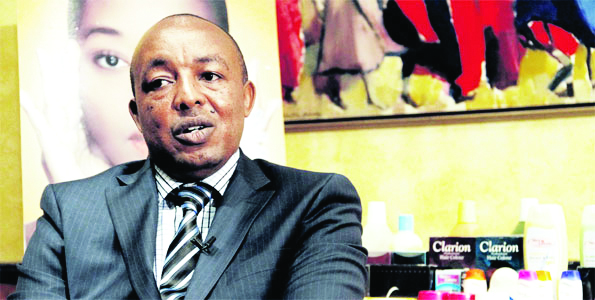From doing backbreaking work in various factories as a casual labourer in Nairobi, to hawking sweets in city commuter buses, hardworking entrepreneur beats odds to create a personal grooming products empire
By Amos Wachira
When he talks about entrepreneurship, the conviction in his words and the enthusiasm he radiates inspires listeners. He started from rock bottom. He has seen it all. Indeed, Paul Kinuthia’s entrepreneurship story is an exhilarating rag to riches classic. From doing backbreaking work in various factories as a casual labourer in Nairobi, to hawking sweets in city commuter buses, the unlikely entrepreneur never allowed his challenging situation to define his destiny. Instead, he went out to create his destiny, overcoming many odds on his remarkable journey to join a small clique of wealthy, successful entrepreneurs that Kenya has produced in the last two decades. When he hived off the health and beauty division of his company and sold it to French cosmetics giant LOreal a few years ago in a multibillion shilling deal, he captured the imagination of many aspiring entrepreneurs, proving beyond doubt that Kenyans entrepreneurs have the potential to create great enterprises worth a fortune.
Today, Kinuthia, who founded Inter Consumer Products Limited in 1995 with a seed capital of only Kshs3000 never shies away from telling his incredible story. Here is how he started.
His journey started when he completed his O Level studies at Dagoretti High school. While he preferred to pursue a course in sales, his father had other ideas. Reasoning that technical courses could easily and quickly land his son a good job, he wanted him to enroll for a technician course at the National Youth Service.
“I always saw myself as a salesman and a business person. That is why I told my father to take me to Kenya Polytechnic for a course in sales,” recalls Kinuthia.
Starting from the bottom
His dream was however cut short when financial challenges made it hard for him to pursue tertiary education. While such realization could spell doom for many high school leavers, it fired up his ambition.
I knew I was on my own. I had to take up any available casual jobs so I could educate myself even as I tried to eke out a living.
Kinuthia knew he had to start from the bottom. Before long, he was working as a casual labourer at his aunties printing press in town. His lack of skills limited his chances of ever getting any other job save for casual labour. When he went to look for a better job at Coca Cola, the giant soft drink maker; he was given a job of repairing crates.
Months later, Kinuthia found himself carting away coffee bags at the Kenya Planters Co operative Union, the national coffee miller, in yet another casual job. Even with the experience gained from his casual jobs, Kinuthia could only get more casual jobs, and his dream of ever getting a formal, permanent job seemed like it was just a pipe dream. When he found himself making ceiling boards out of waste paper at Tetra Pak, a packaging firm, he was not surprised. Casual labour was increasingly becoming his forte.
Inspired to be a salesman
Seeing that his options were getting fewer by the day, the young decided to take up a diploma course in sales and marketing which would later become his ticket to entrepreneurship.
From an early age, Kinuthia says that he was inspired by a family friend to become a salesperson. Growing up, he was always fascinated by the salesman who was supplying Cadburys products. Kinuthia used to envy the salesman so much that he made him his mentor. Most of the times, he could hop into his mentors vehicle for sales escapades, which always inspired his drive to become a salesman.
I realized I had to go out and start meeting people. After TetraPak, I decided to hit the road, he says.
And with the resolve to create a business out of his interactions with people, Kinuthia started out as a hawker, after he was inducted by a friend into the business of selling sweets in buses at the populous Bus Station in Nairobi’s downtown.
When he told his friend who used to sell sweets that he wanted to be free, he was told that he could make more money as a hawker than he could ever make as a casual laborer.
Cosmetics hawker
“My friend encouraged me that I could persevere and survive and overcome all the challenges,” he says.
Before long, Kinuthia had bought his first stock: Tropical Sweets which he sold for Kshs1 a piece. True to what he had been told, he was able to make a small profit. Not one to settle for less, he wanted to venture into the cosmetics business. He had seen how hawkers were making a killing selling cosmetics, though the sellers were unreliable and disorganized. He observed that most of the sellers were drunkards who could not waste any opportunity to imbibe in alcohol when they made a few sales.
Seeing a gap, he delved into the cosmetic business. With his savings, he bought assorted lipsticks, nail polish and eye pencils and rushed to Kenya Bus Station where he sold his commodities. On that first day, Kinuthia made Kshs600 in profits, but what inspired him most was that the profits were more than a months salary at his former jobs. Clearly, he says, there was potential in his newfound business.
He vowed to market himself as a dedicated cosmetics hawker. Five months later, Kinuthia was no longer selling his stuff at the streets: He did door to door sales in a bid to make more money.
”I could get customers in the streets who did not have money. They could invite me to their offices where I could sell to them as well as their colleagues, making substantial amounts of money, he recalls his breakthrough, adding that he could sell more products in one hour than he could on the streets in a day.
With business acumen and good customer service skills, Kinuthia was slowly making a name as a reliable and trusted cosmetics seller. Word of mouth referrals were bearing fruits. It did not take him long before customers started referring him to their boutiques and salons, an opportunity he took up with both hands.
While salons made for good customers, they were asking for a different kind of product: Shampoo. Spotting opportunities has always been Kinuthia’s forte. He saw the high demand that was there for hair shampoos and decided to venture into this kind of business as a manufacturer, however small, than as a trader. “I started researching on how to manufacture it. I realized that manufacturing it was not hard,” he says.
With a huge customer base which trusted him, and the high demand for shampoos in the local market, he embarked on research at a leading chemical manufacturer.
“I told them I have a product, they told me they had a recipe for the product. That is how I started my journey as a manufacturer.”
He realized that he needed simple equipment like drums for mixing his ingredients, cooking stick for stirring the concoction, water and a source of heat.
With a dream, the simple requirements and a will to succeed, Kinuthia convinced a friend who owned a yard in Nairobi’s Kirinyaga road to offer him an unused bathroom to enable him set up his business. He was given the space for free.
Structured business
On the first day, he made some shampoo which he carried home for testing. He gave out samples to his family members as well as to neighbours, who promptly tried out the product and confirmed it was good. The ambitious entrepreneur collected empty containers from salons and packaged his product. To distribute this product, he hired a hand cart which he loaded with 44 jerricans of five liters each.
His shampoo was an instant hit. He sold the entire lot in less than 40 minutes, making a profit of Kshs2400.
“I got the motivation to make and sell more shampoo after the first profits.”
Days later, customers could ask for hair conditioners, and Kinuthia could make the products from his one-and- a-half square meters room in down town Kirinyaga road.
Seeing bright prospects, he moved to a large room in the nearby Gikomba market where he fabricated machinery to enable fast production. It was at this point where he expanded his product line to include hair conditioners. He also structured his business, even as he hired more people to help him run the show. After hiring the services of a quality assurance officer in 1998 he started selling his products to supermarkets under the brand name, Nice N Lovely.
Two years later, Kinuthia moved his company to industrial area where he rented a big godown to accommodate his growing business. Seeing how the business was growing fast, suppliers as well as banks could trust him with credit, which he aptly used to grow the business even further.
Business prowess
“The business was growing so well that at some point, I could tell customers to pay in advance,” he reminisces.
In 2005, Kinuthia increased his product range to include lotions. He also bought land along Mombasa Road where he set up the Nice N Lovely factory. He moved his entire business to the new premises two years later.
Since then, the Nice N Lovely brand has grown in leaps and bounds to become a household name in Kenya and beyond. Kinuthia’s deal making prowess played out when his business attracted the eyes of French cosmetic giant L’Oreal in 2013. He sold the health division, earning billions of shillings in the process.
How did he manage to grow a small idea into an empire?
“In 1999, I made sure that the business was well structured. A friend helped me put up controls and corporate governance structures which allowed the business to run seamlessly even when I was not around.”
The structures, he says, ensured traceability and transparency. Kinuthia attributes his business success to such structures, which gave him the discipline to save most of his profits and plough them back into growing the business.
“Building structures in a business that had none is a prudential business move. It makes the business run on its own. Since then, I have been able to delegate and trust people.”
Interconsumer Products Limited has over the years won several awards in good governance, human resource management, shareholders growth, information, communication technology as well as in quality assurance.
Today, Kinuthia is a serial entrepreneur, with interests in manufacturing, tea farming, and herb farming for export as well as in microfinance. His firm, Interconsumer Products Limited, employs over 300 people directly, with a further 1000 indirect beneficiaries.
Though he sold Interbeauty products, the Nice and Lovely division of Interconsumer Products, he is still making his mark in the world of manufacturing.
InterConsumer Products manufactures Bouncy diapers, All-time sanitary towels and a toilet paper branded, Mr. Fluffy.
“Money comes second. You have to fill a need first and if people appreciate your effort and pay for it, you make money,” he advises. To succeed in business, he says, one ought to understand the business well, create a business model, have a strategy, hire the right people and give them adequate resources, mentor and train them.
As a successful entrepreneur who started from the bottom, he knows a few things about entrepreneurship.
“Young entrepreneurs should learn to set long term goals if they wish to build businesses that will live beyond them. They should not look at getting rich fast, but should be patient and should learn to respect money because it can disappear fast.”
Local manufacturers face a myriad of challenges. From cheap imports that scuttle their businesses to heavy cost of doing business, manufacturers find it hard to succeed in such an environment. This explains why the manufacturing sector is steadily declining, despite its ability to create jobs for millions of people. Kinuthia agrees that more needs to be done to revive the sector. For him, some of the challenges he has faced before include lack of trust. He says that many people do not trust new businesses even when the founders have a clear vision and ambition. Frustration by the government is also a key challenge facing most local manufacturers.
Vision 2030 for instance might not bear fruits. The country can only grow through industrialization but the government has opened doors for people to import goods that could easily be manufactured here.
Despite the few challenges that he faces as a local manufacturer, Kinuthia is raring to grow his business to greater heights.
I want the company to diversify more and contribute more to the economy through paying taxes, lowering capital flight, reducing imports and mentoring people, he concludes.
























